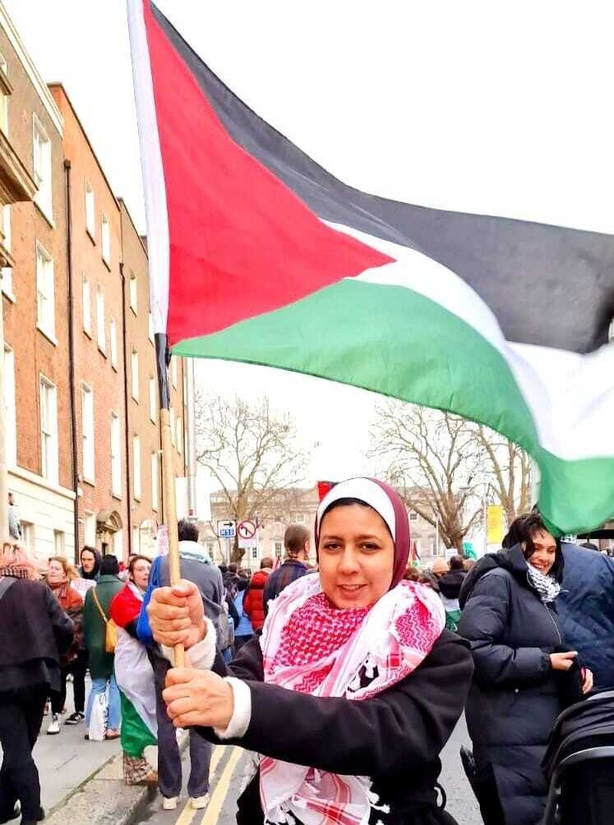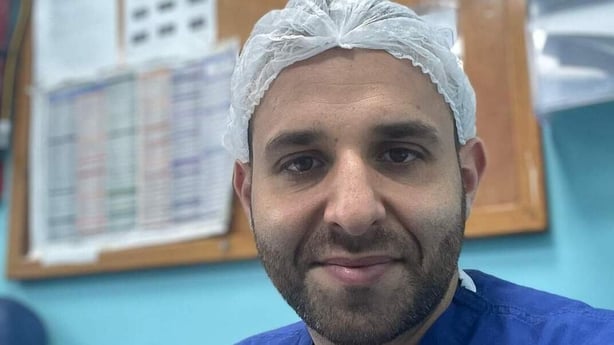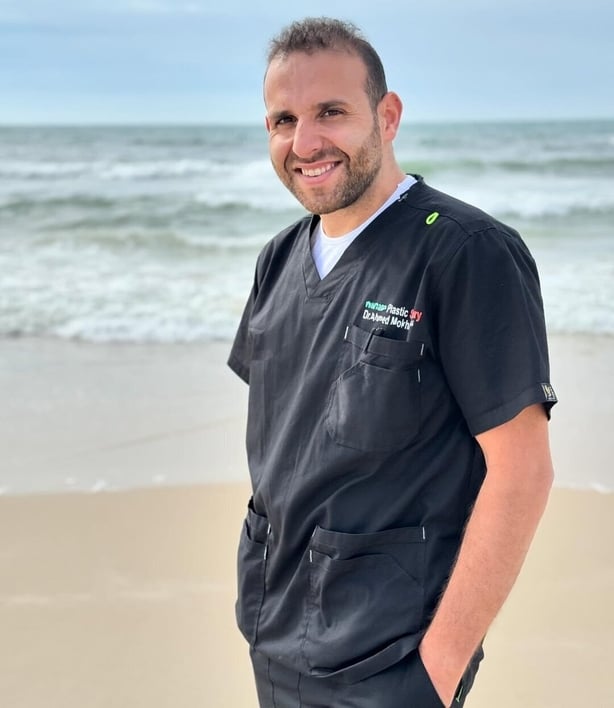Palestinians living in Ireland have welcomed the formal recognition of the Palestinian state.
Ireland, Spain and Norway all recognise Palestine from today.
Ibrahim Abu Shaban is studying computer science and lives in Blanchardstown with his family.
He was in Gaza with his grandparents a week before the Hamas attack on 7 October that triggered the war.
He described Ireland's decision to officially recognise the state of Palestine as "probably one of the best pieces of news I've woken up to in the past seven or eight months".
He added it was a "strong symbol of hope" for Palestinians like him.
"The Irish have always seen Palestine as a state, especially with the island history so they understand the pain of the Palestinians," he said.
We need your consent to load this rte-player contentWe use rte-player to manage extra content that can set cookies on your device and collect data about your activity. Please review their details and accept them to load the content.Manage Preferences
For Mr Abu Shaban's family back in Gaza, he said their family group chat "popped off" once they heard the news that Ireland would officially recognise Palestine.
"It was hopeful for them aswell," he said.
Recognition 'should be followed up with tangible action'
Although other EU member states - Bulgaria, Cyprus, the Czech Republic, Hungary, Poland and Romania - recognise the state of Palestine, these all did so before becoming members of the bloc.
"As a Palestinian living in Ireland, a country that I love very much, it was quite emotional for me to learn that Ireland has decided to recognise Palestine," said Mona Sabella.
"But the emotions come from a lot of difference places," she said.
"Given everything that's going on right now ... there needs to be leadership within Ireland," Ms Sabella said.
"Recognition is one action and it's welcome but it's really a symbolic political move and it should be followed up with tangible action," she added.
Read more:
Palestine recognition keeps two-state solution hopes alive - Taoiseach
Ireland should have recognised Palestine 30 years ago, says expert
Israeli ambassador to Ireland warns of tech impact
Ms Sabella called for Israel to be sanctioned and for arms and trade embargoes to be placed on the country.
Many Palestinians have spoken about the strong sense of solidary they have felt from the people of Ireland since 7 October.
"The people of Ireland have shown incredible solidarity with the Palestinian people," Ms Sabella said.
"They have proven that when people come together and when people unite, that governments will take action and this is a really, really important message, not only for people in Ireland. It's an important message for people around the world.
"We need to see this continued solidarity action," she said.

Sahar Hawamdeh is a healthcare worker who has lived in Ireland for the past three-and-a-half years, she is a Palestinian-Jordanian.
"It's quite a historic step," she said.
"I'm very proud to live in a country that's willing to show such political courage amid all the intimidation amidst all the pressure. I'm so glad the Government went through with it."
As of today, there are 146 countries that recognise the state of Palestine.
However, Ms Hawamdeh said it was important to acknowledge that the recognition of Ireland, Spain and Norway comes from the "heart of the EU".
"I think it sends a message that positions are changing now," she said.
"I also think it would not have happened if not for all the amazing people that have been campaigning, rallying, marching the streets of Dublin and Ireland over the past months."
Ms Hawamdeh said she wanted to see action from Ireland now.
Recognition a 'powerful symbol'
Hana Abushaban is a risk analyst who has always lived in Ireland but considers herself Palestinian.
"Ireland's recognition of Palestine as a state was a powerful symbol," she told RTÉ’s Morning Ireland.
"It shows that the international community is acknowledging our struggles and supports our self-determination".
She added: "It reinforces that our suffering is not forgotten and there is global support for our quest for peace and justice".
Roisin El Cherif is an artist based in Co Galway. Like many Palestinians here she has never been able to travel to Palestine although she has family in Gaza.
"A lot of the Palestinians in the diaspora are not allowed to go in," she explained.
Her family was forced to flee Gaza to Jordan "and we're not allowed to go back ... it's not by choice".
Ms El Cherif said she was "delighted" with the move by Ireland, Spain and Norway to officially recognise the Palestinian state from today.
"Every step to freedom is welcomed," she said, "but it's also not enough".
She called for sanctions to be placed on Israel.
Ms El Cherif said: "I think Irish politics can do a lot better. There's a lot of nice solidarity sentiment, rhetoric in Irish politics and no movement.
"I'm looking forward to Irish politicians putting their money where their mouth is and help bring an end to this genocide.
"If they don't have the power then who does?"
Palestinian Irish surgeon, Dr Ahmed El Mokhallalati is currently working from field hospitals in Rafah and Deir Al-Balah.

Speaking on RTÉ's News At One, he said: "The last two nights have been really hectic with a lot of bombardments."
"Last night there was continuous bombardment starting from 2am til 5am.
"We received the first rush of injured patients at around 3.45am as the ambulances had a real difficultly in reaching the injured patients."
Dr El Mokhallalati said the field hospital he was in received 15 dead bodies and dozens of patients.
"I'm not sure about the exact number yet, but all these patients are coming from tents.
"They are easily injured by being only in the tents ,not being protected by any kind of cement or buildings."
He added that he is seeing entire families dead or just one or two survivors.
"The field hospitals are the main care providers as the health system is totally collapsed ... we have no capacity of dealing with [the injured patients]."
Before the Al Shifa Hospital in Gaza City was stormed by the Israeli Defence Forces last November, Dr El Mokhallalati was the chief plastic surgeon there.
Dr El Mokhallalati said the field hospital is already above its capacity and operating with "very basic needs" and a small amount of blood volunteered from the relatives of patients.
"The basic things are not available," he said adding it was the same situation in other hospitals across Gaza.
"The ICU we have here is more of high dependency units with only two ventilator machines.
"We are losing a lot of patients because of the lack of supplies.
"We have to prioritise the patients based on the very limited resources we have here within the hospital."

Another issue for Dr El Mokhallalati and other healthcare workers in the field hospital is that there is no patient registry. This means people come to them looking for their loved ones and the doctors are not sure of who has been there.
They are keeping dead bodies to one side of the hospital for up to 24 hours without any proper preserving methods.
He said he came across a five-year-old girl running in a crowd, asking for help to find her parents. When they checked they found her parents were dead.
No safe place
Dr El Mokhallalati said that there was no safe place in Gaza.
"I'm staying in what we call deconflicted areas, so the field hospital will have dedicated accommodation in place dedicated to to their staff.
As well as the ongoing war there is no internal security in Gaza.
"There is no system, there is no security," Dr El Mokhallalati said.
"It's a totally insecure place," he added.
Two weeks ago, Dr El Mokhallalati's wife gave birth to their fourth child, a daughter they have named Razan.
"I was expecting this, I tried to come out of Gaza but it's still very complicated," he said.
He said his sisters are helping his wife and children with the new baby but it is hard.
"It's really hard to imagine that my wife has to take care of the kids and bring them to schools and take the baby with her every day," he said.
Dr El Mokhallalati's family including his wife, three sisters and four children, one of whom he has not met yet, are all living in Ireland.







